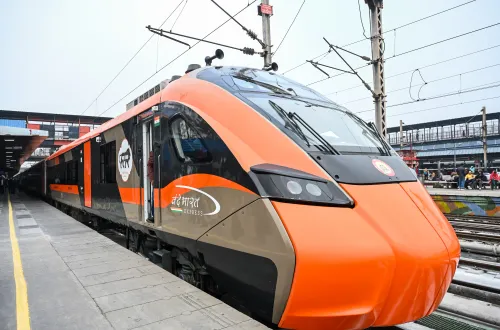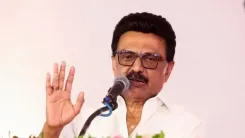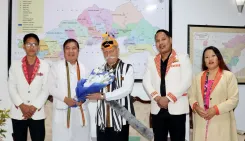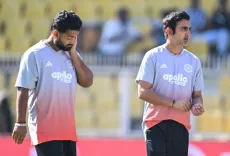Is Kerala the Key Link Between India and Europe in the Blue Economy?
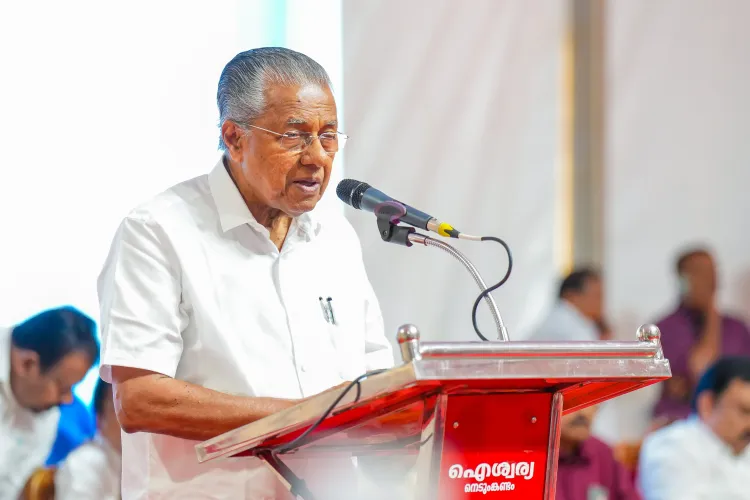
Synopsis
Key Takeaways
- Kerala's strategic location as a bridge between India and Europe enhances its blue economy prospects.
- Collaboration with the EU is essential for sustainable ocean-based growth.
- Key discussions will focus on aquaculture, renewable energy, and coastal tourism.
- Senior leaders from both regions emphasize the importance of this partnership.
- Long-term strategies for investment and cooperation are crucial for successful outcomes.
Thiruvananthapuram, Sep 18 (NationPress) Chief Minister Pinarayi Vijayan addressed the inaugural Kerala-European Union (EU) Blue Economy Conclave, emphasizing that the state's future is deeply connected to the oceans."Kerala has consistently turned to the seas not just for survival but also for innovation, resilience, and development. This conclave represents a chance to forge a global alliance for a sustainable and fair blue economy, with Kerala serving as a bridge between India and Europe," stated CM Vijayan during the two-day event.
The event kicked off on Thursday at the renowned beach destination of Kovalam, with the Chief Minister set to officially inaugurate it on Friday.
This two-day gathering unites senior officials from Kerala, the Government of India, and the European Union to explore new avenues for sustainable ocean-based development.
EU Ambassador to India and Bhutan, Herve Delphin, who is leading the European delegation, highlighted the significance of the conclave as a cooperative forum.
"The partnership between the EU and India spans multiple sectors. Given Kerala's unique capabilities in maritime activities, coastal resilience, wellness, and tourism, there are numerous opportunities for European stakeholders. Thus, this conclave is more than just a singular event; it’s a platform for collaboration where EU expertise and investment can help realize India’s blue economy vision and offer mutual advantages," noted Delphin.
State Minister for Fisheries Saji Cherian, who traveled to Europe to maximize EU participation, remarked that this conclave underscores Kerala’s commitment to sustainable fisheries, aquaculture, and coastal resilience.
"Partnering with the EU and the Government of India, we aspire to create opportunities for our coastal communities while ensuring the long-term health of our marine ecosystems," expressed Cherian.
A "Team Europe" delegation, consisting of ambassadors and senior diplomats from 17 EU member states, is attending the conclave under Delphin's leadership. Delegates from Belgium, Bulgaria, Denmark, Finland, Hungary, Italy, Malta, Poland, Slovakia, Spain, and Romania, along with senior officials from Austria, France, Slovenia, The Netherlands, Germany, and Sweden, make up the mission.
Union Ministers and secretaries from both the Central Government and Kerala are also involved, showcasing strong national backing for blue economy collaboration with Europe.
With a coastline stretching 600 km, extensive inland waters, and rich marine biodiversity, Kerala is leading India’s blue economy evolution.
The European Union has consistently prioritized the blue economy within its sustainable growth framework. In 2022, the sector provided employment to 4.5 million individuals and generated nearly 890 billion pounds in revenue across Europe.
Flagship initiatives like BlueInvest and the European Ocean Pact are spearheading efforts in clean maritime transport, renewable energy, circular economy models, and fisheries sustainability, presenting collaborative prospects with India and Kerala.
The conclave will focus on climate-resilient coastal development, harbor modernization, logistics and shipping investments, sustainable aquaculture and post-harvest innovations, renewable energy, education and skill enhancement, and coastal tourism.
Policy dialogues, expert panels, and networking sessions will address long-term strategies for investment and collaboration.




